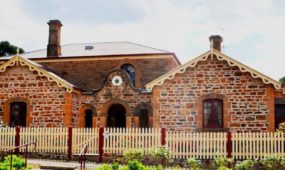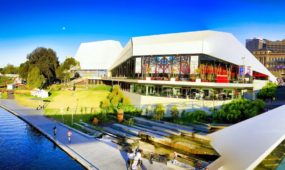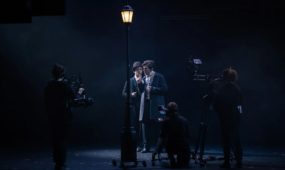The Captioning Studio reinvents accessibility
Arts
NARI Jennings grew up in a house without sound. She isn’t deaf, but her family has a history of genetic deafness. Many of her mother’s siblings were born deaf and her mother progressively lost her hearing through a sensorineural condition.

Sign up to receive notifications about new stories in this category.
Thank you for subscribing to story notifications.
“As she was becoming profoundly deaf, a lot of noise and music was really distressing to her. I grew up in a home where, out of courtesy to my mum, the TV was always on mute and we didn't play any music,” Jennings says.
When Jennings was sixteen years old, her only hearing aunt took her to see Puccini's La Boheme.
“It changed my life. I'd never been to a live event before. I'd never heard singing like that. I'd never seen the costumes. I remember just sitting there and thinking I want to find a way to bring my family and friends who are deaf to come and experience this, because I'd never seen anything like it.”
Jennings co-founded The Captioning Studio in Adelaide, South Australia, in 2004 with her husband Alex French. At the time, the idea of accessibility in theatres was limited to large, basic LED panels – two lines of capital letters in bright red.
“You'd spend most of your time looking at the screen and not what's on stage,” Jennings says.
Their solution was Go Theatrical! – a brand new technology for live performance. It involved plasma screens and scripted captioning. The Captioning Studio get their hands on a script or prepare their own in advance. One of their staff listen in on the show and manually prompt lines to appear as the performance happens.
In 2010 they created the mobile and tablet Go Theatrical! app, which allows people to bring their own devices to the theatre and non-intrusively watch the show.
Alex French, a former engineer at IBM and BBC Television, said that the response to Go Theatrical! has been overwhelming.
“There's a lady that we know in Canberra who is one of the first people to go to the captioned theatre. She hadn't been to the theatre in 23 years because her hearing was getting progressively worse and it just wasn't fun anymore,” French explains.
“Even though it was her passion, going to the West End in London and the theatre, she couldn't. Now she and her husband sign up every year to the whole season. They bring a whole load of friends and they're all enjoying the theatre again. That's the real reward.”
Their technology is rounded out by audio description. It moves in another direction than Go Theatrical! – their audio description work is for blind and low vision people rather than those with hearing loss.
“They can use our app,” says Jennings, “and someone will be describing what's going on on-stage in between the dialogue. So describing the costumes and the facial expressions and the action.”
Vision Australia supported that development, and the Sydney Opera House were one of the first to install it.
Their technology is now the only theatre captioning service used in Australia. Almost every major venue in the country uses it, and most major theatre and musical theatre companies use the technology as well. Major festivals have also taken it on board, including the Adelaide Festival and Sydney Festival. Touring musicals such as WICKED and Dirty Dancing have also put the system in place.
They also implement live captioning for conferences, lectures and other unscripted events.
“The Captioning Studio does provide some international services. Our 'live' captioning systems for theatre and live events like lectures and conferences work over the internet with live audio being sent to a captioner and the captions being sent back to the viewer in the venue via our cloud-based servers,” French says.
“The systems have been designed and developed by The Captioning Studio and are really fast – so much so that for an event we captioned in the UK from Adelaide recently a theatre patron asked to meet the captioner and was very surprised to learn they were on the other side of the world.”
The Captioning Studio has been highly decorated for their work. They've won many 'Best Event Captioning' titles at National Captioning Awards in years past. More recently, they won the Business Human Rights Awards from the Australian Human Rights Commission in 2011. In 2012, they won the National Disability Awards.
“If I saw someone walking down the street with a hearing aid and asked them if they knew they could go to the theatre with captioning, most of them would say they had no idea. These awards are a way of getting the word out.”
For The Captioning Studio however, there are honours more prestigious than the awards bestowed upon them. Alex French has a number of moments he picks out as truly rewarding in their career so far.
“The best example is a text message Nari received on Christmas Day. It was from a student who had struggled all the way through her whole school life. She was in University doing her first year and she wrote to say thank you so much for what your staff have done for me this year,” French explains.
This is an example of their live captioning capability – a highly trained court writer or stenocaptioner listens to a live feed of a lecture or event, and within two seconds their accurate-to-the-word captions will show up on the user's screen.
“This student said it was the first time she had gone through a year of education and really understood everything that's been going on. She inspired us so much. She was in a wheel chair, she was physically disabled as well as profoundly deaf – and just amazing.
“The most rewarding thing is seeing somebody going and doing something amazing that we all enjoy and take for granted, like going to the theatre. Going to an event. That's the most rewarding thing.”
Nari Jennings and Alex French recently founded another startup company, Peepable. Recently named Anthill Online's Coolest Company of 2014, they're seeking to liberate online videos through innovative search technology, partially spun out from The Captioning Studio. Peep back on The Lead South Australia next week for our follow up feature on Peepable.
Jump to next article



